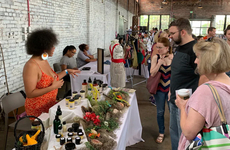
Fair Trade Online Store
Bianca — March 30, 2012 — Social Good
References: globalgoodspartners.org
What's it like working with a group of motivated social entrepreneurs in New York? We had the opportunity to interview Jennifer Gootman, Executive Director of Global Goods Partners, to find out.
In the answers below, Jennifer offers a glimpse into her career, explains the business model behind the online fair trade gift store, and she shares some of the tricks she uses to replenish her creativity.
4 Questions With Jennifer Gootman, Executive Director of Global Goods Partners
1. How did the idea for the business model come about?
Global Goods Partners was founded in 2005 by Catherine Shimony and Joan Shifrin, development professionals who through their past work encountered inspiring income generation projects around the world that lacked access to the US market. Global Goods Partners is founded on the belief that improving the economic status of women globally is an integral part to eradicating poverty and building civil society. A fully inclusive and healthy society cannot exist without the voices, efforts and leadership of women. We are dedicated to a holistic approach to poverty alleviation and social justice, supporting women's cooperatives and micro-enterprises as a critical means to women's empowerment.
When women receive the tools to learn a craft, manage their finances, or start and run a business, they gain experience, confidence, practical skills and economic independence. They are empowered to develop themselves fully as human beings and challenge existing gender inequity issues. They move beyond achieving simple economic improvements and are able to make a real positive impact on the well-being of their families, communities, and countries.
Today, we work with nearly 40 groups from 20 countries, providing market access, product development and technical support, and small grants. We have close to 500 products that we sell retail and wholesale through our website. We are harnessing the surge in popularity among U.S. consumers for handmade accessories to create jobs, generate income, and change women’s lives around the world. Rather than traditional notions of charity, we believe that if given the proper infrastructure and support, women can forge a path out of poverty for themselves and their children.
2. How did you decide to join this sector?
Through their prior development work, Joan and Catherine were convinced that income generation is key to women's empowerment. They realized that they could use their network in the US and knowledge of market trends to help bring these handcrafted products the last mile to the consumer.
Before joining Global Goods Partners, I spent 8 years working for New York-based nonprofits in the arts and economic development. Alongside my nonprofit career, I designed and produced my own line of jewelry. In 2008, after realizing the impact that a formal business education could have on the nonprofit sector, I returned to school to get my MBA.
As part of my summer placement while in school, I worked with a vocational training program in Nicaragua that trained and employed youth from the garbage dump neighborhood of Managua in jewelry making to provide an income alternative to trash collection. The intersection of social impact, artisanry and business was the perfect match for my interests and experience. Armed with a strong sense that this was the way I could have the greatest impact, I met Joan and Catherine and joined Global Goods Partners in 2010.
3. How do you get your inspiration?
Our inspiration is in large part from our partners. They are amazingly strong women from around the world who, despite adverse conditions, are working to improve their lives, their families' prospects, and their communities. Some are survivors of the sex trade, others are war survivors. Despite the hardship in their past, they believe in and are working towards a positive future.
Artistically, our partners are full of inspiration. Many use traditional artisan techniques that have been passed from generation to generation, like Aj Quen's woven scarves from Guatemala. Others are supremely resourceful with limited materials available, like Friends International's glitter wallet that's made from recycled chip and candy wrappers.
For our ordering inspiration, we have an ever-evolving mood board in the office to track the latest trends. We follow trend projections and try to make our product line reflect what is "hot" now. We want people to buy Global Goods Partners' products because they love them, they're fashionable, and they're well made.
4. How do you reset yourself to be creative? Do you have any rituals?
Sometimes in the blur of running a business, it can be hard to take a step back and give your mind the space it needs to generate new and fresh ideas. We like to take field trips to some of the great museums in New York to get design ideas. We're constantly clipping magazines, discussing product attributes, and reading up on the latest trends. One great source of inspiration---the world outside! There are few better places for the latest style and design ideas than the streets of New York.
In the answers below, Jennifer offers a glimpse into her career, explains the business model behind the online fair trade gift store, and she shares some of the tricks she uses to replenish her creativity.
4 Questions With Jennifer Gootman, Executive Director of Global Goods Partners
1. How did the idea for the business model come about?
Global Goods Partners was founded in 2005 by Catherine Shimony and Joan Shifrin, development professionals who through their past work encountered inspiring income generation projects around the world that lacked access to the US market. Global Goods Partners is founded on the belief that improving the economic status of women globally is an integral part to eradicating poverty and building civil society. A fully inclusive and healthy society cannot exist without the voices, efforts and leadership of women. We are dedicated to a holistic approach to poverty alleviation and social justice, supporting women's cooperatives and micro-enterprises as a critical means to women's empowerment.
When women receive the tools to learn a craft, manage their finances, or start and run a business, they gain experience, confidence, practical skills and economic independence. They are empowered to develop themselves fully as human beings and challenge existing gender inequity issues. They move beyond achieving simple economic improvements and are able to make a real positive impact on the well-being of their families, communities, and countries.
Today, we work with nearly 40 groups from 20 countries, providing market access, product development and technical support, and small grants. We have close to 500 products that we sell retail and wholesale through our website. We are harnessing the surge in popularity among U.S. consumers for handmade accessories to create jobs, generate income, and change women’s lives around the world. Rather than traditional notions of charity, we believe that if given the proper infrastructure and support, women can forge a path out of poverty for themselves and their children.
2. How did you decide to join this sector?
Through their prior development work, Joan and Catherine were convinced that income generation is key to women's empowerment. They realized that they could use their network in the US and knowledge of market trends to help bring these handcrafted products the last mile to the consumer.
Before joining Global Goods Partners, I spent 8 years working for New York-based nonprofits in the arts and economic development. Alongside my nonprofit career, I designed and produced my own line of jewelry. In 2008, after realizing the impact that a formal business education could have on the nonprofit sector, I returned to school to get my MBA.
As part of my summer placement while in school, I worked with a vocational training program in Nicaragua that trained and employed youth from the garbage dump neighborhood of Managua in jewelry making to provide an income alternative to trash collection. The intersection of social impact, artisanry and business was the perfect match for my interests and experience. Armed with a strong sense that this was the way I could have the greatest impact, I met Joan and Catherine and joined Global Goods Partners in 2010.
3. How do you get your inspiration?
Our inspiration is in large part from our partners. They are amazingly strong women from around the world who, despite adverse conditions, are working to improve their lives, their families' prospects, and their communities. Some are survivors of the sex trade, others are war survivors. Despite the hardship in their past, they believe in and are working towards a positive future.
Artistically, our partners are full of inspiration. Many use traditional artisan techniques that have been passed from generation to generation, like Aj Quen's woven scarves from Guatemala. Others are supremely resourceful with limited materials available, like Friends International's glitter wallet that's made from recycled chip and candy wrappers.
For our ordering inspiration, we have an ever-evolving mood board in the office to track the latest trends. We follow trend projections and try to make our product line reflect what is "hot" now. We want people to buy Global Goods Partners' products because they love them, they're fashionable, and they're well made.
4. How do you reset yourself to be creative? Do you have any rituals?
Sometimes in the blur of running a business, it can be hard to take a step back and give your mind the space it needs to generate new and fresh ideas. We like to take field trips to some of the great museums in New York to get design ideas. We're constantly clipping magazines, discussing product attributes, and reading up on the latest trends. One great source of inspiration---the world outside! There are few better places for the latest style and design ideas than the streets of New York.
Trend Themes
1. Fair-trade Movement - Businesses can explore incorporating fair-trade principles to empower women globally while enhancing product offerings.
2. Social Entrepreneurship - Entrepreneurs can leverage their networks and market trends to improve access to handcrafted products while supporting income generation programs globally.
3. Sustainable Fashion - Brands can create trendy and well-made products by utilizing traditional artisan techniques and recycled materials from their partners around the world.
Industry Implications
1. Retail - Retailers can tap into the growing demand for handmade accessories and integrate fair-trade principles to differentiate offerings and promote social and environmental responsibility.
2. E-commerce - E-commerce platforms can incorporate socially responsible product lines and connect customers with handcrafted products from remote communities worldwide.
3. Nonprofit - Nonprofits can partner with local artisans and designers worldwide, using fair-trade principles to create economic and social empowerment, and promote sustainable development.
3
Score
Popularity
Activity
Freshness























